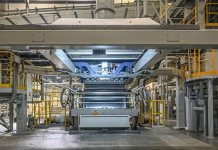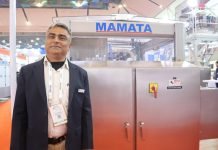
The Colombian packaging manufacturer Microplast Coldeplast, based in Medellín, has invested for the first time in a 5-layer blown film line with inline MDO from Hosokawa Alpine. The plant went into operation in 2023 and produces PE and MDO-PE films for various laminating films, which are then used in flexible packaging solutions. This not only increases the company’s production capacity, but also contributes to the circular economy in the packaging industry.
Monomaterial packaging – packaging that consists only of polyethylene – has a decisive advantage over plastic packaging that combines different materials such as PE, PET, PP or PA: it is much easier to recycle and can be reused for end products after the recycling process without any loss of material. This makes full PE packaging a much more sustainable solution than other packaging materials and also complies with the principles of the circular economy. The desire for more recyclable packaging solutions also drove the Colombian company Microplast Coldeplast. “In many markets, the demand for recyclable packaging has risen sharply or is even encouraged by laws and government regulations. To remain competitive in the long term and open up new markets, we need to adapt our technology,” says Lina Fajardo, head of technical marketing and sustainability at Microplast Coldeplast.
Hand in hand for more sustainability
The company has been producing flexible packaging solutions at two production sites in Medellín since 1956, including for food, pet food, household and care products and building materials. Microplast Coldeplast mainly processes PE, PET, BOPP, PA, aluminium and paper and supplies its customers with rolls and bags. In line with its corporate strategy and global market trends, the company needed to increase its production capacity and make its products more recyclable. Al, PET and BOPP should therefore be replaced by PE monomaterial solutions in some laminations. In search of a partner to realize this project, Microplast Coldeplast turned to Hosokawa Alpine. The decisive factor in this decision was the global experience that the Augsburg-based machine and plant manufacturer has in the field of full PE packaging solutions. “As a pioneer in MDO technology, we have been working with monoaxial stretching of blown film for over 25 years. Over 100 of our systems are in use around the world,” says Marcelo Gräf, senior sales manager at Hosokawa Alpine. The company relies on customized systems that are developed and adapted specifically for the customer’s product.
Optimized film properties and reduced material consumption
The MDO process begins with a heating phase, here the film is conveyed on heated rolls and brought to the ideal temperature. In the following stretching phase, the film is stretched between two rollers to achieve the desired stretching ratio. At the same time, the film thickness is reduced, while optical and mechanical properties such as transparency, rigidity and barrier properties are improved. “The thinner film thickness reduces the amount of material required. This not only conserves resources, but also saves on material costs,” explains Gräf. Temper rollers then reduce the stresses created during stretching. The film then runs over two chill rollers and is brought to a suitable temperature for winding. Depending on the application, the film runs over a total of eight to twelve rollers in this process, two of which are stretch rollers.
In addition, the MDOs from Hosokawa Alpine are equipped with three unique features: TRIO technology (Trim Reduction for Inline Orientation) for optimised flatness and significant material savings when trimming edge trim, flexible adjustment of the stretching gap to reduce necking and the unique vacuum technology for optimum flatness and outstanding process stability.
Solution for full PE and HDPE
Microplast Coldeplast uses a 5-layer blown film line from Hosokawa Alpine with inline MDO and a layflat width of 1600 mm. The company then produces full PE films, which are further processed into various flexible packaging solutions.
A particular challenge in the development of the system was, in addition to some specific technical features, the process stability with a low film thickness of 25 µm. The extensive experience of the Augsburg team helped here: “Throughout the entire process, Hosokawa Alpine provided us with excellent technical service and support – from the purchase to the installation and commissioning of the system,” says Jorge Diaz, operations director at Microplast Coldeplast. The new plant has enabled the packaging manufacturer to increase its production capacity to over 400 million linear metres per year. This is another reason why Microplast Coldeplast is optimistic about the future. “We can well imagine developing more products with Hosokawa Alpine,” says Diaz.









